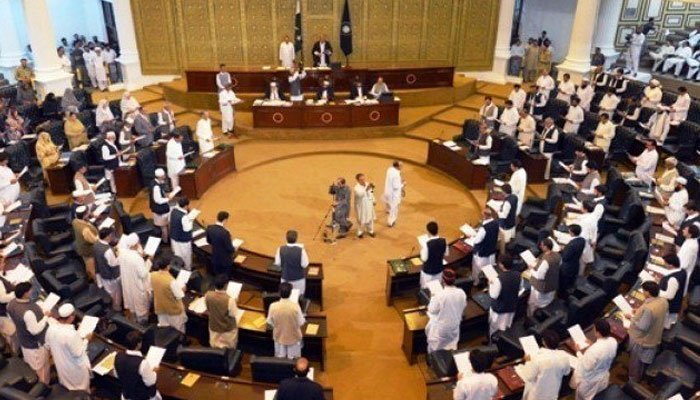On Oct 26 last year, the then caretaker government unveiled its Rs529.11 billion spending plan from November to February.
The caretaker cabinet was de-notified on March 1, a day after the expiry of those four months, without the authorisation of the spending of the provincial government.
Chief Minister Ali Amin Khan Gandapur presented the expenditure for one month in a sitting chaired by Speaker Babar Salim Swati.
Opposition objects to move insisting CM is not govt
The house also passed a resolution declaring the assembly a polling station for the March 9 presidential election.
The CM tabled a resolution for the approval of “grants and authentication of the schedule of authorised expenditure” in accordance with provisions of Article 123 of the Constitution regarding the government’s expenditure.
He read out the resolution and authenticated the authorisation of over Rs159 billion in respect of the estimated expenditure in relation to the affairs of the government from March 1 to March 31, 2024.
The current expenditure includes over Rs23 billion for tehsil government salaries, over Rs3 billion for tehsil government non-salary, Rs19 billion for health, over Rs8 billion for police, over Rs12 billion for pensions, over Rs10 billion for subsidies, over 1 billion for local government, over Rs1.5 billion for Zakat and Ushr, over Rs1.6 billion for public health engineering, over 1 billion for roads, highways, bridges, building and structure repair, and over Rs3 billion for higher education, archives, and libraries.
Over Rs231 million was approved for the provincial assembly, over Rs675 million for general administration, over Rs461 million for finance, treasury, and local fund audits, and over Rs1 billion for the administration of justice.
The opposition members raised questions about the approval of the budget in absence of the provincial cabinet.
“We request you not to bulldoze the Constitution. The chief minister is not the government. This act of his is unconstitutional,” Pakistan Peoples Party MPA Ahmad Kundi said.
Pakistan Muslim League-Nawaz member Dr Ibadullah said why an unconstitutional way was adopted to do something that could be managed constitutionally.
“What if only two members of the provincial cabinet are announced and the cabinet members approve the expenditure in a day or two,” he said.
However, Treasury member Akbar Ayub insisted that the assembly was more powerful than the cabinet so it could approve the government’s expenditures, and that happened in Punjab as well.
He added that the chief minister headed the government, so basically, he was the government.
Former speaker of the provincial assembly and current MPA Mushtaq Ahmad Ghani said a new conspiracy was being hatched to deprive the Pakistan Tehreek-i-Insaf of the due assembly seats reserved for women and religious minorities.
“We should not be forced to protest outside the premises of the Election Commission of Pakistan and the National Assembly,” he said.
The speaker said the matter was sub-judice, so the house should not discuss it.
The assembly later adopted another resolution declaring its hall as the polling station for the presidential election to be held on March 9.
Assembly Speaker Babar Salim Swati prorogued the session afterward.
Later, Mr Kundi of the PPPP told Dawn that the Sunni Ittehad Council members of the KP Assembly voted for the expenditure of Rs159 billion for March, which was an unconstitutional act as, without the approval of the cabinet, the “vote on account” could not be tabled in any assembly.
“At the moment, the cabinet [in KP] is awaited. Only the chief minister has taken the oath of office,” he said.

